tireman9
Well-known member
I haven't been as active on Heartland as I would like but I have a dozen forums to monitor and of course my RVTireSafety.com blog, plus I do have other interests. But I felt I might help owners have a better understanding of tires and tire problems with this summary
First off there is a lot of confusion about tire failures. Incorrect terminology makes it harder or even impossible to properly diagnose the reason for a failure. I think you can understand that if you run over a screw or nail there is a good chance you will leak air which can ultimately lead to a Run Low Flex failure (most call this a Blowout). Any tire can get a puncture so blaming the tire is of no value.
You can also have a leaking valve or an actual failure of the valve body itself which again leads to air loss followed by Run Low Flex failure
You might have a detachment of the tread and/or belts from the body. In this cast the tire may even retain all its air. The cause for this can be excess heat or age has caused a loss in flexibility and strength of the belt rubber.
Finally there may have been a problem during manufacturing. In this case we usually see a batch (100 to 100,000) tires that might have a failure. Usually there is a recall.
Run Low Flex failures can be almost completely eliminated if you run a TPMS. While checking the air each morning is good thing to do, it does nothing to warn you that you have a leaking valve or a cut or puncture. It only takes a few miles at very low pressure to flex the sidewall to the point the body ply melts.
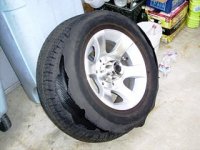 and
and 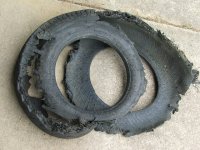 and
and 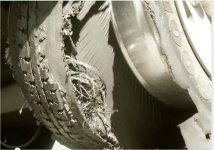 are examples of Run Low Flex failures
are examples of Run Low Flex failures
Here is what melted body cord can look like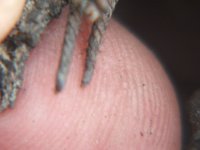 or
or 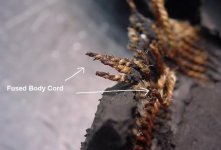
These conditions are physical proof the tire was run miles at significant underinglation and highway speed.
A Tread detachment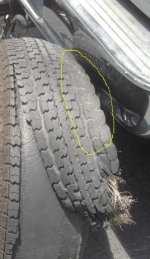 results from weakening of the belt rubber. If the wrong rubber was used in manufacturing( defect) the tire would most likely fail at very low mileage. A much more likely cause is accelerated aging of the belt rubber. This occurs when the tire is overheated. The aging rate of rubber doubles with every 18F increase in temperature so parking with the tire in full sun and not under a white cover can accelerate the aging ( loss of strength) to 4 times as the test I wrote about in this post shows a 36F increase in tire temperature because of no cover.
results from weakening of the belt rubber. If the wrong rubber was used in manufacturing( defect) the tire would most likely fail at very low mileage. A much more likely cause is accelerated aging of the belt rubber. This occurs when the tire is overheated. The aging rate of rubber doubles with every 18F increase in temperature so parking with the tire in full sun and not under a white cover can accelerate the aging ( loss of strength) to 4 times as the test I wrote about in this post shows a 36F increase in tire temperature because of no cover.
Another cause of increased belt rubber temperature comes from higher speed and certainly increase heat comes from higher loading. These affects are additive.
Finally we need to remember that damage (aging) to the rubber is cumulative and cannot be reversed. Once you run your tire underinflated putting air back in the tire does not repair the damage already done. The heat/time affects are cumulative and every hour/day week spent at elevated temperature causes the belt rubber to loose its elasticity which can lead to tearing and ultimately to a belt/tread separation.
I have over 100 blog posts and I am sure there is a lot of information that you might find of value, so take a look if you have more questions.
I have my email posted on the blog under my picture and will answer questions. I do ask you provide the complete tire size information including Load Range and your tire loading will certainly help.
Roger
First off there is a lot of confusion about tire failures. Incorrect terminology makes it harder or even impossible to properly diagnose the reason for a failure. I think you can understand that if you run over a screw or nail there is a good chance you will leak air which can ultimately lead to a Run Low Flex failure (most call this a Blowout). Any tire can get a puncture so blaming the tire is of no value.
You can also have a leaking valve or an actual failure of the valve body itself which again leads to air loss followed by Run Low Flex failure
You might have a detachment of the tread and/or belts from the body. In this cast the tire may even retain all its air. The cause for this can be excess heat or age has caused a loss in flexibility and strength of the belt rubber.
Finally there may have been a problem during manufacturing. In this case we usually see a batch (100 to 100,000) tires that might have a failure. Usually there is a recall.
Run Low Flex failures can be almost completely eliminated if you run a TPMS. While checking the air each morning is good thing to do, it does nothing to warn you that you have a leaking valve or a cut or puncture. It only takes a few miles at very low pressure to flex the sidewall to the point the body ply melts.
 and
and  and
and  are examples of Run Low Flex failures
are examples of Run Low Flex failuresHere is what melted body cord can look like
 or
or 
These conditions are physical proof the tire was run miles at significant underinglation and highway speed.
A Tread detachment
 results from weakening of the belt rubber. If the wrong rubber was used in manufacturing( defect) the tire would most likely fail at very low mileage. A much more likely cause is accelerated aging of the belt rubber. This occurs when the tire is overheated. The aging rate of rubber doubles with every 18F increase in temperature so parking with the tire in full sun and not under a white cover can accelerate the aging ( loss of strength) to 4 times as the test I wrote about in this post shows a 36F increase in tire temperature because of no cover.
results from weakening of the belt rubber. If the wrong rubber was used in manufacturing( defect) the tire would most likely fail at very low mileage. A much more likely cause is accelerated aging of the belt rubber. This occurs when the tire is overheated. The aging rate of rubber doubles with every 18F increase in temperature so parking with the tire in full sun and not under a white cover can accelerate the aging ( loss of strength) to 4 times as the test I wrote about in this post shows a 36F increase in tire temperature because of no cover.Another cause of increased belt rubber temperature comes from higher speed and certainly increase heat comes from higher loading. These affects are additive.
Finally we need to remember that damage (aging) to the rubber is cumulative and cannot be reversed. Once you run your tire underinflated putting air back in the tire does not repair the damage already done. The heat/time affects are cumulative and every hour/day week spent at elevated temperature causes the belt rubber to loose its elasticity which can lead to tearing and ultimately to a belt/tread separation.
I have over 100 blog posts and I am sure there is a lot of information that you might find of value, so take a look if you have more questions.
I have my email posted on the blog under my picture and will answer questions. I do ask you provide the complete tire size information including Load Range and your tire loading will certainly help.
Roger
